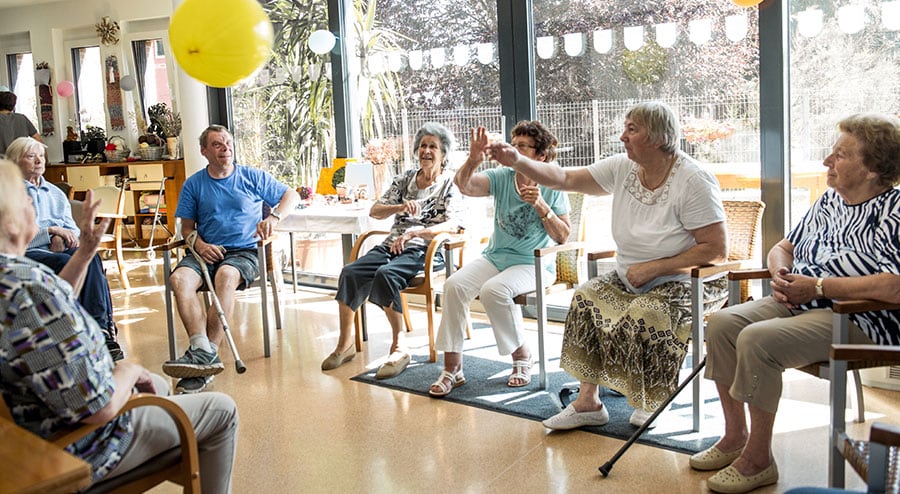Get professional care and comfort with trusted Assisted Living services.
Just How Aided Living Facilities Enhance Lifestyle for Those With Mental deterioration
The assimilation of engaging programs and household participation additionally enriches the locals' experience. The complexities of mental deterioration treatment proceed to evolve, motivating a more detailed evaluation of exactly how these centers adjust and innovate to satisfy the obstacles faced by locals and their households.
Personalized Treatment Plans
(Dementia Care Charlotte)Oftentimes, people with mental deterioration need customized support that resolves their unique demands and preferences. Individualized care plans are crucial in assisted living setups, as they make sure that each resident receives proper focus and solutions. These plans are created collaboratively, including healthcare professionals, caregivers, and relative to develop a detailed summary of the individual's clinical background, cognitive capabilities, and personal rate of interests.
A well-structured tailored care strategy commonly consists of certain goals connected to health and wellness monitoring, daily activities, and social interaction. It accounts for the individual's cognitive decline while advertising self-reliance and self-respect. Regular assessments and updates to the care plan are important, as they permit for alterations based upon the local's progressing condition and preferences.
Secret parts of these strategies typically include medicine management, behavioral assistance strategies, and nutritional guidelines customized to the person's demands (Assisted Living). By concentrating on individualized care, helped living facilities can promote a supportive environment that boosts the lifestyle for individuals with dementia, ultimately contributing to their overall wellness and happiness. This individualized strategy values the originality of each homeowner, guaranteeing they receive the caring care they call for

Involving Tasks and Programs
Engaging homeowners in significant activities and programs is essential for improving the top quality of life for people with dementia. These tasks not just provide satisfaction yet also boost cognitive feature and advertise social interaction, which can minimize feelings of seclusion typically experienced by homeowners.

In addition, personalized programs are important in guaranteeing that each citizen's unique preferences and capacities are acknowledged. This customized approach motivates involvement, improves self-confidence, and provides a feeling of achievement.
Furthermore, normal assessments of citizens' passions can aid staff modify and adjust activities to better suit progressing needs. By prioritizing interesting tasks and programs, helped living centers can considerably boost the general experience and emotional health of individuals living with mental deterioration.
Safe and Helpful Setting
Producing a secure and encouraging atmosphere is important for individuals with dementia, as it straight influences their well-being and high quality of life. Assisted living centers are designed with certain functions that promote safety and security while promoting a complacency and comfort. These environments focus on ease of access, with designs that reduce complication and motivate freedom, permitting citizens to browse their environments a lot more conveniently.
Precaution, such as secure entrances and departures, avoid roaming and unapproved accessibility, which are critical factors to consider for individuals with dementia (Assisted Living). Team members are educated to recognize the distinct needs of citizens, offering customized assistance and supervision to ensure their security. The consolidation of calming colors and acquainted items can aid decrease stress and anxiety and disorientation, creating an extra calming atmosphere.
Along with physical security, emotional assistance is critical. Facilities usually use staff that are not only competent in caregiving but likewise educated in compassion and interaction, cultivating count on and rapport with residents. This all natural approach contributes to a nurturing environment where individuals feel valued and understood, ultimately enhancing their overall lifestyle.
Social Interaction and Area
A supportive environment not only prioritizes safety and security however likewise promotes opportunities for social communication and community engagement, which are important for individuals with mental deterioration. In assisted living facilities, organized tasks and common areas motivate residents to get in touch with each other, reducing sensations of isolation typically experienced by those with cognitive problems.
Social communication plays a substantial function in boosting emotional well-being and cognitive function (Memory Care). Involving with peers in group tasks such as video games, arts and crafts, or workout not just boosts cognitive capacities however additionally supports a feeling of belonging. Facilities frequently arrange occasions that advertise socializing, permitting locals to construct connections and share experiences, which can be especially advantageous for those with dementia
In addition, a lively area atmosphere can boost the total high quality of life for locals. Personnel members are educated to facilitate communications and assistance residents in forming purposeful connections. By producing a society of engagement, helped living centers aid people with dementia preserve social skills and boost their state of mind, ultimately adding to an extra satisfying life experience. This community-oriented method is vital in handling the difficulties related to dementia, advertising a sense of purpose and continuity for residents.
Household Involvement and Support
Household participation is essential in supporting individuals with mental deterioration in assisted living settings. Actively engaging relative not only provides psychological convenience to citizens but also cultivates a sense of belonging and connection in their lives. When families join treatment preparation and day-to-day tasks, they add useful insights about the individual's choices, history, and needs, which can enhance customized care.
In addition, regular family gos to can significantly improve the psychological wellness of residents, minimizing sensations of seclusion and anxiousness. Household participants can likewise assist in maintaining cognitive feature by engaging their enjoyed ones in familiar discussions and tasks. This communication enhances personal identity and assists locals feel valued and understood.

Conclusion
In verdict, aided living centers substantially boost the high quality of life for people with mental deterioration via individualized treatment strategies, engaging tasks, and a risk-free environment. These components foster cognitive stimulation, emotional well-being, and a feeling of freedom. Normal social interactions and solid family members involvement contribute to purposeful links and psychological assistance. Collectively, these elements produce an alternative strategy to care that addresses the distinct needs of people with mental deterioration, promoting overall wellness and dignity.